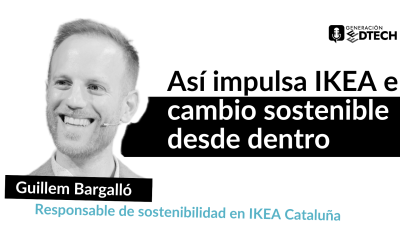Well, it was about time to put on the table everything that is happening on the subject of mental disorders because there is one fact: around a third of the population in Spain says that they suffer from some mental disorder, in all its degrees, from the most serious ones to stress, depression, etcetera.
Do you think that this is finally changing and that talking about mental disorders is really becoming less stigmatized?
“I would say very slowly. There is still a lot of stigma. What happens is that it is true that there is a little more talk. I think that since the pandemic there have been many depressions, anxiety crises and so on, which have happened to people, and there has been a little more talk about mental health, which is always important to make visible. There are also celebrities, as you mentioned before, who have come out saying that they have some kind of mental disorder. And, well, it’s trying to be normalized a little bit, but there’s still a long way to go.”
There is a lot left, right?
And the media also talk more about mental health, although on the other hand they also promote stigma; sometimes they do promote it, don’t they?
But are we aware, José, of the importance and the seriousness of the situation of a good part of the population that has this type of problem, or are we still not aware of that reality?
“I think we are becoming so little by little. I even believe that, at the level of government and institutions, measures are already being taken in relation to stigma and for the benefit of mental health care. I do believe that things are changing”.
Well, and among other things thanks to associations like yours, such as SAPAME.
Sensi, tell me a little about it.
What do you do on a daily basis at SAPAME?
“We are a non-profit association, managed by the members themselves, and, above all, importantly, we are in the first person; that is, no relatives come, it is the mental health users who participate in this association. We fight for the defense of our rights, for social integration, for recovery through an autonomous and consented life project for the person. That is precisely why we are in the first person. We do a lot of activities to integrate a little bit, to get out of our isolation.”
“We have workshops, the truth is that it is a long list: mindfulness, yoga, biodance, painting, reading, theater…. There are two different psychologists who give two different workshops, computers, music therapy, multipurpose, hiking and, above all, the mutual support workshop, which is very important. It is a mutual support among equals, it is not led by any professional, it is the users themselves who give this support to each other. Each one tells his or her problem and we empathize a lot. Although we don’t give advice, we say: ‘Well, something similar has happened to me, I have done this’ or ‘We feel very identified’. It’s a safe space where, when you arrive, you see that you’re not a freak. You see that there are more people with the same problem as you and, then, the truth is that people open up.”
“Many times, at the beginning, people come with relatives because they don’t have enough autonomy and, little by little, you see them coming on their own, that they are a little more independent, that they feel more, that they talk more, that they are coming. Simply having a routine, having a reason to get up in the morning and say: ‘Ah, well, look, I’m going to do things, I’m going to see people’. There, usually, you make quite a few friends; we’re like a second family, really. The activities help us socialize. For that, we also have an activity which is the cultural visits, and sometimes some of our family members also come. And then, trips that we organize with a company here in Granada. We also organize trips; now we are going to Costa Brava and then to Palencia, and we have a good group from SAPAME. And that helps us, because one thing it does is that we lock ourselves at home, we don’t want to go out, and that makes us socialize as well and go out.”
“Sensi, you talk about empathy, and I guess that’s very important in an association where it’s the users themselves who manage it.”
“We have empathy because we have all gone through similar problems, although each one has a different diagnosis, because there are many different mental illnesses, but we have always gone through similar processes. Now it’s funny because we have made some short films against stigma, they are like mini-shorts, and for example, at the end, we put the title ‘Se te nota’. One of the shorts was about, for example, that you are walking down the street and you think that everybody is looking at you, that they are talking about you, that they are laughing at you. That’s a very typical thing that we’ve all been through. So, when you arrive at SAPAME, the first thing we do is to welcome you. We have a social worker who, coincidentally, is also a user. She does a reception and there people tell us what is happening to them, although we do not ask them to report what illness they have or anything, but they tell us a little bit of what is happening to see if SAPAME is suitable for what they need. We work on that and then we also accompany them throughout the whole process. When a person is absent, it happens that they come, then they go a while without coming, then we try to call that person to see what has happened, if it is wrong. We follow up.”
